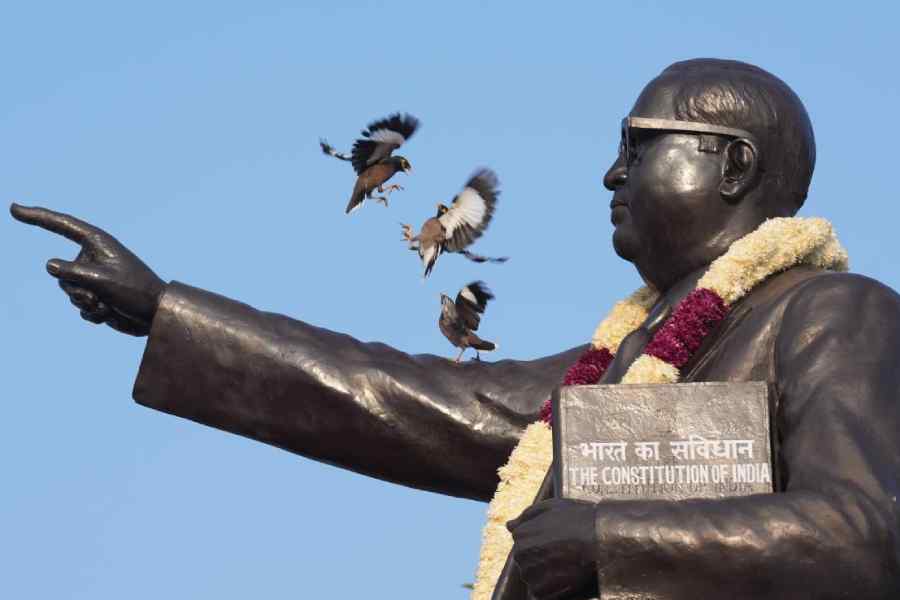Babasaheb Ambedkar is not only the pre-eminent moral force of our times but also a deity who is devoutly worshipped. I have always been intrigued by the religious fervour with which he is revered. On December 6, at Chaityabhoomi in Mumbai, I began to somewhat understand the foundations of this deification. That day, I witnessed first-hand both the spiritual core of Ambedkar worship as well as the political opportunism it has spawned.
At Chaityabhoomi, Ambedkar’s final resting place, December 6 was not just his death anniversary, it was also Mahaparinirvan Divas, the day Ambedkar attained moksha. Ordinary people had travelled from across the state of Maharashtra and beyond to pay their respects on this day, the holiest in their calendar.
The sight was Kumbh mela-esque. Shivaji Park had become a temporary tent city to accommodate more than one lakh visitors. All roads leading to the park were shut to vehicles and full of stalls selling Ambedkar and Gautama Buddha paraphernalia. Notable amongst the stalls were bookstores doing brisk business selling Ambedkar and Dalit literature. The area was chock-a-block and trains heading to Dadar were so overcrowded that regular commuters found it hard to get on or off.
The queue itself to enter the samadhi was pythonesque. For those familiar with the geography of south-central Mumbai, it snaked all the way from Dadar beach past Siddhi Vinayak Mandir, a distance of nearly two kilometres. Speaking to several people waiting hours in the queue, I could feel a genuine sense of devotion — this was not the death anniversary of a mortal leader of men and women; it was a holy day marking the ascent of a beloved guru. Chaityabhoomi wasn’t just his resting place — it was a temple, a place of worship for Dalits, praying at which would make all of one’s wishes come true.
If Arun Shourie had been present, he might have rethought the title of his book on Ambedkar — Worshipping False Gods. That Ambedkar was a false god because of what he did or did not do in life is beside the point. What was relevant on December 6 was the legacy of Dalit pride that Ambedkar had left behind. As a Dalit, he was a martyr who had given his life to secure a better future for his brethren. He had made his mark both nationally and globally, spoken and written boldly, and wore his Dalit identity on the sleeve of his trademark blue blazer. His followers had an unadulterated sense of gratitude to him for giving them a dignified existence — they had come to give their thanks and pay their respects. It was like any other temple.
Like all temples, this one too was marked by its patent inequalities. There was a special celebration open only to VIPs. It was ironic that the celebration was branded Samanvay Divas (Solidarity Day) while keeping out anyone who wasn’t a VIP without much cognitive dissonance. Here the poverty of contemporary political thought was on full display. In the presence of the governor, the chief minister and both deputy chief ministers of Maharashtra, a line-up of political leaders had two primary demands — declare December 6 not just a holiday in Mumbai but for the whole state; second, increase the height of a proposed Ambedkar statue. The superficiality of these asks compared to the depth of Ambedkarite thought was striking. Ambedkar had been fully politically appropriated—remembering him was no longer about trying to achieve a political vision of Dalit empowerment and integration but a symbolic display of solidarity. Worse still, symbols like holidays and statue heights had been conflated with genuine empowerment.
One isn’t sure how Ambedkar himself would have reacted to these demands. Having been vilified for most of his life, first for his low birth and then his iconoclastic political views, some part of him might have welcomed the mainstream celebration of his existence. But it is hard not to imagine a part of him that would have seen such vacuous speechifying as a disservice to his life’s work.
The greatest tribute to Ambedkar’s vision in independent India has been paid not by those demanding ever-taller statues of him but rather by those who have engaged constructively with his thoughts and ideas. One of the foremost amongst them was D.R. Nagaraj, a political commentator and cultural critic, who wrote in Kannada. Nagaraj, who proudly described himself as an atishudra, critiqued Ambedkar’s conversion to Buddhism at the end of his life. Emancipation would not be achieved by giving up on one’s cultural mores and gods and goddesses but rather by embracing and celebrating them. Equally, he called for Dalit-Bahujan movements to go beyond Ambedkar’s politics of entitlement for Dalits, which was a product of its time, to a politics of dignity for Dalits. Neither was a repudiation of Ambedkarite thought. On the contrary, these were attempts to keep Ambedkarite thoughts evolving and relevant, not only for Dalit politics but also for national politics on the whole.
One could see resonances of both these thoughts on December 6. Dalits had taken heed and were now celebrating Ambedkar himself as their own god in contradistinction to the traditional Hindu pantheon. Mainstream politicians were jostling for space to accommodate this increasingly assertive Dalit mobilisation with even bigger statues and public holidays. But whither dignity for Dalits?
Less than 200 metres away, I found my answer. In a bookstore, a seemingly sympathetic patron wondered why there was such an annual tamasha of “these people”. Were the politicians offering free food and doles, she asked. Mahaparinirvan Divas may soon become a public holiday nationally. But even a semblance of genuine dignity and substantive equality for Dalits will take much longer.
Arghya Sengupta is Research Director, Vidhi Centre for Legal Policy. Views are personal










